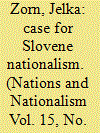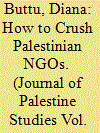| Srl | Item |
| 1 |
ID:
086962


|
|
|
|
|
| Publication |
2009.
|
| Summary/Abstract |
When Slovenia became a sovereign state in 1991, it had to define who its citizens were. Were all residents of Slovenia, regardless of their ethnic belonging, equal in this respect? This article provides an answer to this question by elucidating certain parts of the secession legislation - the initial designation of citizenry and one of its indirect outcomes, the erasure from the register of permanent residents. The ethnic/civic dichotomy will be applied in order to demonstrate opposing nationalist claims made by the ruling elite. In terms of specific processes, Slovene nationalism will be presented in three distinct phases: counter-state nationalism (before the break-up of Yugoslavia), state-building nationalism (the initial designation of citizenry), and the nationalising state (after the secession; marked by the erasure and threats to revoke citizenship statuses of naturalised citizens).
|
|
|
|
|
|
|
|
|
|
|
|
|
|
|
|
| 2 |
ID:
188237


|
|
|
|
|
| Summary/Abstract |
Israel has long sought to erase Palestinians, Palestinian resistance, and Palestinian organizations. In Israel’s latest rendition of erasure, Palestinian nongovernmental organizations (NGOs) have become the new target. By labeling NGO staff, and now NGOs, as “terror-affiliated,” Israel is attempting to silence these organizations by making it impossible for them to be funded. Looking at the case of Mohammed El Halabi from World Vision, one can see that it does not take much for donors to run scared: just using the “t” word is sufficient, with no need for evidence.
|
|
|
|
|
|
|
|
|
|
|
|
|
|
|
|
| 3 |
ID:
123496


|
|
|
|
|
| Publication |
2013.
|
| Summary/Abstract |
This paper directly challenges the persisting argument that in the host-(uninvited) guest relationship of Kimberley coastal tourism in Australia's far northwest, Traditional Owners (the hosts) have a pedagogic responsibility to first educate the tourism industry (the guests) of their impacts on them in order to facilitate culturally appropriate and sustainable tourism experiences. We contend that such an argument reflects a deeply entrenched context of erasure and power imbalance between Australian Aboriginal and non-Aboriginal people. We highlight, using three decades of public records, the fact that government and industry have ignored and continue to ignore knowledge and learning shared by Kimberley Aboriginal peoples in attempts to rectify serious issues of cultural impacts and risks to visitors arising from unsanctioned tourism activities on Traditional Owners' land and sea country. We argue for the possibility of tourism operating in a mutually satisfactory hybrid space in which acknowledgement, tolerance and respect discharges the need for understanding different ontologies that operate within that space but provides the potential for learning. Using Bourdieu's notion of transformative practice, we propose that the development of such a hybrid space could transform the problem of unsanctioned tourism access to the Kimberley coast into an iteration that could facilitate its taming and thus a shift towards sustainable practices based on mutual recognition and respect.
|
|
|
|
|
|
|
|
|
|
|
|
|
|
|
|